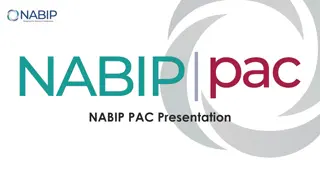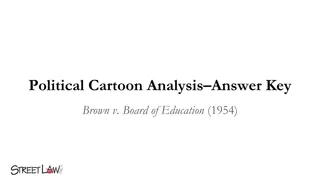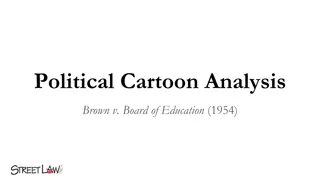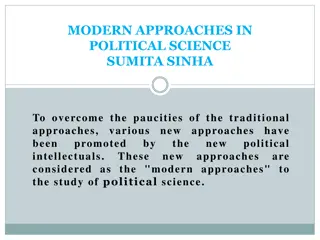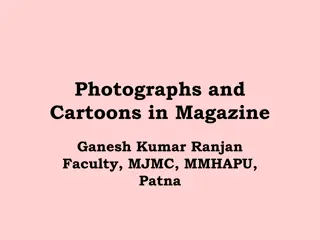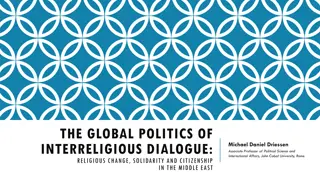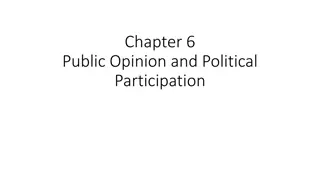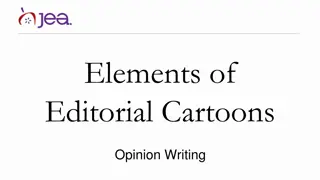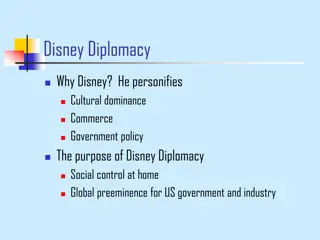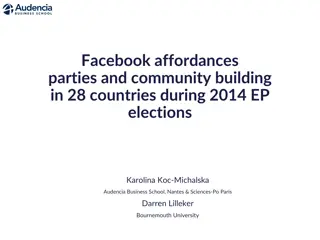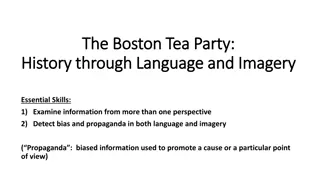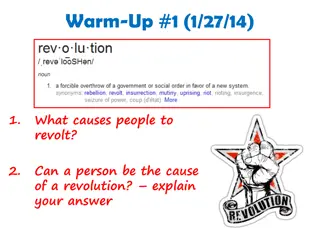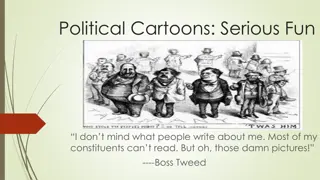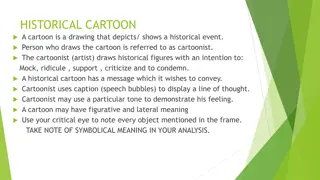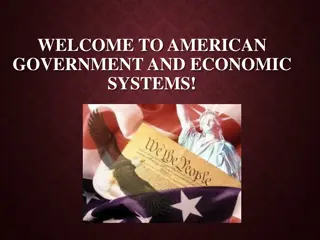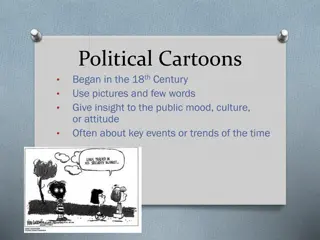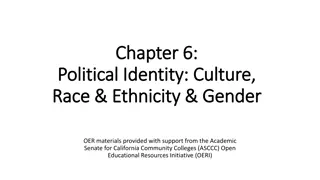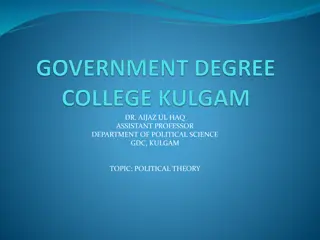Understanding NABIP PAC: Political Action Committee Overview
Federal law prohibits direct financial contributions to federal candidates, hence organizations like NABIP establish Political Action Committees (PAC) to advocate for political priorities. Learn about NABIP PAC, its accounts, eligibility criteria, contribution rules, and how funds are utilized. Disc
1 views • 14 slides
CUBAN REVOLUTION
Explore the impact of the Cuban Revolution through a series of political cartoons, focusing on the visuals, message, and persuasive techniques used to convey opinions on key events such as Fidel Castro passing the presidency to his brother Raul, depiction of Cuban embargo, and the Cuban Missile Cris
2 views • 14 slides
Analysis of Political Cartoons on Brown v. Board of Education (1954)
The analysis examines two political cartoons related to the Brown v. Board of Education case in 1954. The first cartoon symbolizes victory against segregation, portraying the Supreme Court's support for desegregation. In contrast, the second cartoon criticizes the forced progress of desegregation, a
2 views • 10 slides
Political Cartoon Analysis
Explore and analyze a series of political cartoons related to the Brown v. Board of Education case from 1954. Examine the visuals, symbols, messages, and potential political bias in each cartoon. Consider the differing perspectives and reactions that different groups might have towards the messages
0 views • 6 slides
Contrasting Concepts in Political Science: Normative vs Descriptive Approaches
Normative and descriptive concepts in Political Science explore contrasting viewpoints on how things should be versus how they actually are. While normative claims focus on value judgments, descriptive claims deal with facts. These concepts complement each other by providing both theoretical and pra
0 views • 10 slides
Understanding the Cuban Missile Crisis in Historical Context
Explore various aspects of the Cuban Missile Crisis, including the political cartoons, Kennedy's response, USA's reactions to the Cuban Revolution, USSR's involvement in Cuba, and the outcomes of the crisis. Learn about the key players, their decisions, and the impact on Cuba, USA, and the USSR.
2 views • 37 slides
Modern Approaches in Political Science: Overview and Characteristics
Explore modern approaches in political science pioneered by intellectuals to address the limitations of traditional methods. These approaches emphasize empirical data, interdisciplinary study, and scientific methods to draw conclusions beyond political structures and historical analysis. Key modern
1 views • 13 slides
The Significance of Photographs and Cartoons in Print Media
In contemporary society, newspapers and magazines heavily rely on photographs and cartoons to inform, educate, and entertain their readers. Photojournalism enhances storytelling by communicating through images, while cartoons offer a humorous approach to discussing serious issues. Both mediums play
0 views • 8 slides
Interdisciplinary Approach in Political Science and Its Relation with History
The need for an interdisciplinary approach in political science emerged in the 20th century to study political issues from various social science perspectives. This approach emphasizes the interrelation between political science and other disciplines like history. History provides the foundation for
0 views • 23 slides
Institutionalism and Methodological Issues in Political Science
Institutionalism is a foundational concept in political science, emphasizing the study of governing institutions and their role in shaping political behavior. It explores inductive and deductive approaches to research, highlighting the significance of empirical evidence and theoretical assumptions.
0 views • 19 slides
State-Sponsored Interreligious Dialogue in the Middle East: A Political Analysis
This research delves into the growth of state-sponsored interreligious dialogue initiatives in the Middle East between 2000-2020. It explores the political significance, impact on relations between political and religious authorities, and implications for religious practices in the region. The thesi
0 views • 23 slides
Understanding Gramsci's Political Theory and its Relevance Today
Gramsci's political theory, focusing on concepts such as hegemony, historical bloc, and the role of intellectuals, offers valuable insights into contemporary political challenges. Explored through the lenses of Prof. Ken Spours and Stuart Hall's analytical tradition, this analysis sheds light on Con
0 views • 13 slides
Evolution of Citizenship in Liberal Democracy
Citizenship within liberal democracy entails equal rights, duties, liberties, and constraints for individuals within a political community. The entrenchment of civil and political rights has shaped the struggle for membership and participation in political communities. Civil rights, essential for in
1 views • 11 slides
Understanding Political Theory through a Contextual Approach
Exploring G.H. Sabine's perspective on political theory through a contextual approach, emphasizing the importance of historical context and societal influences. Sabine argues that while political theory evolves with its contemporary politics, it should be analyzed within its specific time and social
0 views • 9 slides
Understanding Public Opinion and Political Participation
Public opinion and political participation are influenced by various factors such as financial interests, family, education, and party identification. Measuring public opinion accurately through scientific surveys is crucial in a democracy. Traditional participation methods like voting and civic vol
5 views • 7 slides
Exploring the Elements of Editorial Cartoons in Opinion Writing
Discover the significance of editorial cartoons in conveying opinions through visual storytelling. Uncover why editorial cartoons are effective, whether they need to be humorous, and the key elements such as analogy, irony, symbolism, and labels. Dive into examples illustrating how these elements ar
0 views • 9 slides
Disney Diplomacy: Cultural Influence and Political Objectives
Disney's role in diplomacy, particularly in South America, reveals a complex interplay between cultural dominance, commercial interests, and government policies. The Good Neighbors Office aimed to counter German propaganda through positive American portrayal, but overlooked cultural differences and
4 views • 8 slides
Analysis of Facebook Affordances for Political Parties During the 2014 EU Elections
Research by Karolina Koc-Michalska and Darren Lilleker explores how political parties across 28 countries utilized Facebook affordances during the 2014 European Parliament elections. The study investigates the impact of social media on voter behavior, community building, and political engagement. Fi
0 views • 22 slides
Understanding Political Beliefs and Behaviors: A Comprehensive Overview
Explore the formation, evolution, and transmission of political beliefs, as well as the impact of differing beliefs and behaviors on the political process. Delve into platform issues, political affiliations, and their influences to gain a deeper understanding of the political landscape.
1 views • 53 slides
Understanding Nationalism in Political Science
Nationalism, a complex concept, defines the nation as the fundamental unit of political rule. It encompasses a mix of objective and subjective factors, including cultural, ethnic, and political traits. The definition of a nation is subjective, based on how its members perceive themselves as a distin
0 views • 27 slides
Understanding Political Science: A Comprehensive Overview
The study of political science delves into various aspects, from the pursuit of the good society to the exercise of power and the allocation of resources. It encompasses specialized fields such as American politics, international relations, comparative politics, public policy, and political philosop
0 views • 5 slides
Analyzing Bias and Propaganda in Boston Tea Party History
Explore the Boston Tea Party through language and imagery, learning to examine information from multiple perspectives and detect bias and propaganda. Engage with visual materials, such as political cartoons, and texts like the 1773 Massachusetts Gazette article to determine if they were created by p
0 views • 10 slides
French Revolution Warm-Up Series
This series of warm-up activities explores various aspects of the French Revolution, such as causes of revolt, key events, changes during different phases, and the roles of significant figures like Napoleon. Students are prompted to analyze political cartoons, identify estate characteristics, sequen
0 views • 9 slides
Understanding Political Cartoons: A Satirical Art Form
Political cartoons use humor and satire to convey messages, often poking fun at politicians and societal issues. They employ various techniques like caricature, symbols, metaphors, irony, sarcasm, and stereotypes to make powerful statements. These cartoons can influence public opinion and spark disc
0 views • 8 slides
Exploring the Art of Historical Cartoons
Delve into the world of historical cartoons and learn how cartoonists use satire, symbolism, and caricature to convey messages about significant events and figures. Understand the contextualization, intention, and symbolism behind these artworks through examples and analysis, revealing the hidden la
0 views • 9 slides
Exploring Editorial Cartoons and Opinion Writing
Editorial cartoons and opinion writing are powerful mediums used to express opinions on various topics. Editorial cartoons convey opinions through visual imagery and minimal text, while opinion writing presents the author's stance on timely issues. When crafting an opinion piece, it is essential to
0 views • 7 slides
Political Development Theory and Practice: An Overview
Political development refers to the evolution of institutions forming the political power system of a society. Initially popular in the 60s-70s to describe political change, it later fell out of favor for being Euro-centric but has since regained significance. The concept encompasses aspects like po
0 views • 13 slides
Political Party Funding Act 2018 Overview
The Political Party Funding Act of 2018 in South Africa aims to enhance multi-party democracy by regulating the funding and donations to political parties. It establishes the Multi-Party Democracy Fund funded by private sources, alongside the existing Represented Political Party Fund. The Act prohib
0 views • 17 slides
Understanding Political Party Funding Act of 2018
The Political Party Funding Act of 2018 regulates the funding of political parties in South Africa, ensuring equitable and proportional funding for parties participating in national and provincial legislatures. The Act defines various terms such as donations, foreign persons, and political parties,
0 views • 42 slides
Evolution of Political Ideas and Influences on American Founding
In the history of politics, major ideas like laws of nature, unalienable rights, divine right of kings, social contract theory, and rights of resistance have influenced the American founding. Various traditions such as Judeo-Christian, English common law, Enlightenment, and republicanism played a si
0 views • 68 slides
Understanding American Government and Economic Systems
Explore the nuances of the American government and economic systems through activities, discussions, and assessments. Delve into the differences between the House and Senate, analyze political cartoons, and ponder essential questions about the functioning and relevance of the U.S. government. Gain i
0 views • 22 slides
Understanding Political Cartoons: Symbols, Metaphors, and Irony
Political cartoons are historical snapshots that use visual symbols, metaphors, and irony to reflect public sentiments and critique current events. Through visual distortion, stereotypes, and caricature, these cartoons offer insights into culture and attitudes, aiming to provoke thoughtful discourse
0 views • 18 slides
Understanding Wilson's 14 Points and the Treaty of Versailles in History Class
Explore Wilson's Fourteen Points, analyze the Treaty of Versailles, and evaluate the Senate's perspective in this engaging history lesson. Dive into political cartoons, essential skills, and group activities to enhance understanding of key historical concepts.
0 views • 7 slides
Explore the Fascinating World of Political Science
The Department of Political Science offers a range of courses, delving into topics such as political theory, international relations, and governance. Understand the distinction between politicians and political scientists, and explore branches of political science like public administration and huma
0 views • 16 slides
Understanding Political Identity: Culture, Race & Gender in Society
Explore the intricate aspects of political identity, culture, race, ethnicity, and gender in society. Discover how individuals shape their identities and the impact of political mobilization on society. Uncover the significance of political socialization and the role of societal institutions in shap
0 views • 20 slides
Evolution of Political Protests in Modern Russia: A Historical Overview
This article provides an in-depth analysis of the evolution of political protests in modern Russia from 1990 to present. It discusses the attitude of Russian journalists towards protests, basic concepts of political protest in modern political science, myths surrounding protests in Russia, and the f
0 views • 24 slides
Impact of Political Stability on Equity Trading Costs of Cross-Listed Firms
The research explores the relationship between political stability and equity trading costs of cross-listed firms, highlighting the impact of political institutions, liquidity, and investor protection. It delves into the importance of factors like quality of political institutions, transparency, and
0 views • 24 slides
Interdisciplinary Relationships in Political Science
Political science and history share a symbiotic relationship, with history providing the foundation for political analysis while political science influences historical events. The contribution of economics to political science is evident in how economic conditions shape political ideologies and pol
0 views • 12 slides
Understanding Political Theory: Definitions, Differences, and Significance
Political theory encompasses systematic explanations of political phenomena, distinct from political thought which involves ideas and opinions of philosophers. It constitutes both political science and philosophy, addressing both empirical and evaluative aspects. The significance lies in finding sol
0 views • 7 slides
Remedial Measures Implemented by Indian Political Party
Explore the impactful remedial measures taken by a prominent political party in India through a collage presentation. Delve into the functions of political parties, understanding partisanship, the necessity of political parties, and more. Gain insights into the significance and role of political par
0 views • 23 slides
